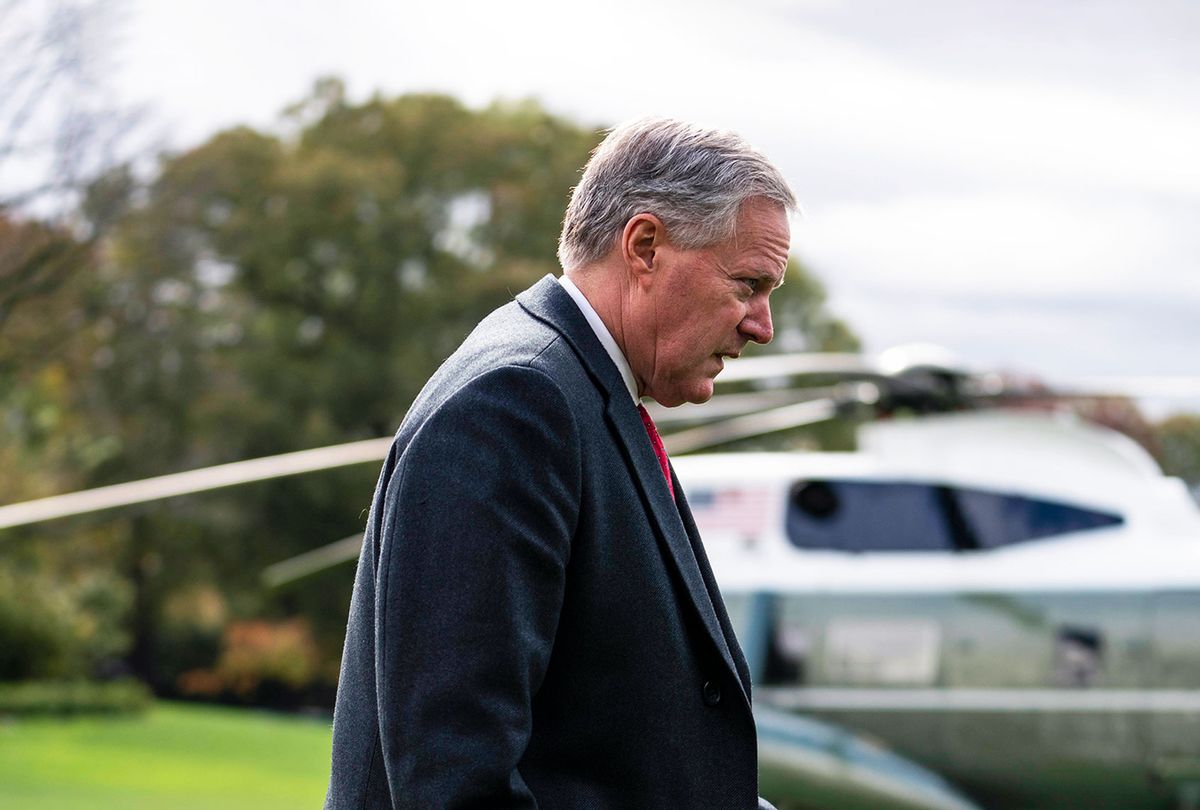Fulton County District Attorney Fani Willis laid out her case against former White House chief of staff Mark Meadows in a filing to a federal judge who shot down the ex-Trump aide's attempt to avoid arrest this week.
Willis' filing came after U.S. District Court Judge Steve Jones on Wednesday rejected Meadows' and former DOJ official Jeffrey Clark's bids to halt Fulton criminal proceedings, ensuring they will face arrest this week.
Meadows and Clark both filed to move their cases to federal court, arguing that they were acting under their official duties as federal officials and that they have immunity from charges stemming from those actions.
Jones, an Obama appointee, explained that a federal court cannot block their state-level arrest unless it "assumes jurisdiction over a state criminal case."
"The clear statutory language for removing a criminal prosecution … does not support an injunction or temporary stay prohibiting District Attorney Willis's enforcement or execution of the arrest warrant," Jones wrote, adding that defendants can even stand state trial while their motions to move the cases to federal court are pending.
Willis pushed back on Meadows' bid to halt his arrest, noting that even Trump himself "voluntarily agreed to surrender himself to state authorities, while other defendants have already surrendered."
Jones has set a hearing for Monday on Meadows' bid to move the case to federal court.
Willis in a 22-page filing on Wednesday rejected Meadows' claim that his efforts to help former President Donald Trump overturn his election loss were part of his official duties.
"He has demonstrated no basis for an objectively reasonable belief that his actions were necessary and proper to perform his duties while evidence demonstrates that he had personal or criminal motivations for acting," Willis wrote.
Meadows' attorneys argued in their filing that the Fulton case is "precisely the kind of state interference in a federal official's duties that the Supremacy Clause of the U.S. Constitution prohibits, and that the removal statute shields against."
But Willis argued that Meadows' "criminal intent" undercut his argument.
"Federal removal is designed to protect federal functions from State interference, but that was not a risk in 2020 or 2021 and is not a risk now," Willis wrote. "Instead, this case concerns attempts to interfere in State functions by federal officials without any authority of their own."
We need your help to stay independent
The filing argues that the charges against Meadows are specifically focused on actions he took outside of the scope of his job, including his attendance at a "clearly political" November 20, 2020 White House meeting with Michigan lawmakers in which Trump peppered them with false claims of election fraud. The next day, Meadows sought to connect Trump with two Pennsylvania lawmakers, which Willis said was also "clearly political activity."
Willis argued that these actions violated the Hatch Act, a federal law barring government employees from using their official roles to influence the outcome of an election.
Willis argued that Meadows' actions focused on the election results in Georgia, including his trip to observe Georgia's election audit on December 22, 2020 and subsequent request to a state official offering campaign funds to ensure the audit was completed by Jan. 6, 2021 were not part of his official duties.
"The defendant thus explicitly contacted a Georgia official on behalf of the Trump campaign, which is political activity prohibited by the Hatch Act," Willis wrote.
Want a daily wrap-up of all the news and commentary Salon has to offer? Subscribe to our morning newsletter, Crash Course.
The prosecutor added that Meadows' participation in Trump's infamous phone call demanding Georgia Secretary of State Brad Raffensperger "find" enough votes to overturn his loss was also prohibited activity.
"Since the defendant was forbidden by law to use his authority or influence to interfere with or affect the result of an election or otherwise participate in activity directed toward the success of Mr. Trump as a candidate for the presidency, every single one of these activities fell outside the scope of his duties," Willis wrote.
Willis cited a federal investigation into the Trump administration's Hatch Act violations, quoting Meadows telling investigators at the time that "nobody outside the Beltway really cares" about the Hatch Act violations.
Former federal prosecutor Andrew Weissmann, who served on special counsel Bob Mueller's team, praised Willis for "skillfully" using Meadows' own statement against him.
"The court will care, I think," he wrote on X, formerly Twitter.
"This is an exceptionally strong argument from the Fulton County DA's office against removal of Meadows' case to federal court: Meadows was doing political work as Chief of Staff contrary to federal law (the Hatch Act) and therefore he can't claim the shield of federal law," wrote Georgia State Law Prof. Anthony Michael Kreis.
"This was always an uphill battle for Meadows," added former federal prosecutor Renato Mariotti. "I can understand why he made the argument but it's apparent the DA was ready to litigate this issue."
Read more
about Mark Meadows

Shares